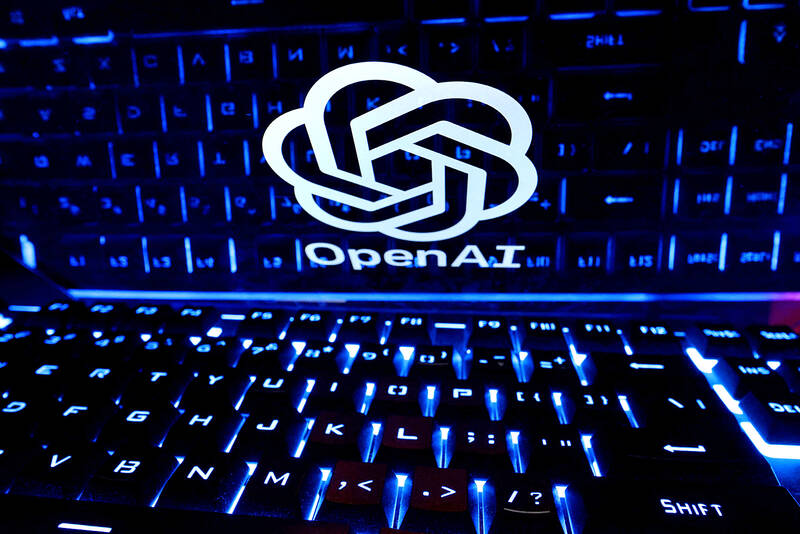OpenAI is working with Broadcom Inc to develop a new artificial intelligence (AI) chip specifically focused on running AI models after they have been trained, according to two sources familiar with the matter.
The AI start-up and chipmaker are also consulting with Taiwan Semiconductor Manufacturing Co (TSMC, 台積電), the world’s largest chip contract manufacturer, said the sources, who asked not to be identified because the discussions are private.
OpenAI has been planning a custom chip and working on such uses for the technology for about a year, but the discussions are still at an early stage, the sources said.

Photo: Reuters
OpenAI declined to comment. A representative for Broadcom did not respond to a request for comment, and a TSMC spokesperson said the company does not comment on rumors and speculation. Reuters reported on OpenAI’s ongoing talks with Broadcom and TSMC on Tuesday. The Information reported in June that Broadcom had discussed making an AI chip for OpenAI.
The process for taking a chip from design to production is long and expensive. OpenAI is less focused on graphics processing units, chips that are used to train and build generative AI models — a market that has been cornered by Nvidia Corp.
Instead, it is looking for a specialized chip that would run the software and respond to user requests, a process called inference. Investors and analysts expect the need for chips to support inference would only grow as more tech companies use AI models to field more complex tasks.
OpenAI might continue to research setting up its own network of foundries, or chip factories, one of the sources said, but the start-up has realized that working with partners on custom chips is a quicker, attainable path for now. Reuters earlier reported that OpenAI was pulling back from the effort of establishing its own chip manufacturing capacity.
Broadcom is the largest designer of application-specific integrated circuits — chips designed to fit a single purpose specified by the customer. The company’s biggest customer in this area is Alphabet Inc’s Google. Broadcom also works with Meta Platforms Inc and TikTok owner ByteDance Ltd (字節跳動).
When asked last month whether he has new customers for the business, given the huge demand for AI training, Broadcom chief executive officer Hock Tan (陳福陽) said that he would only add to his short list of customers when projects hit volume shipments.
“It’s not an easy product to deploy for any customer, and so we do not consider proof of concepts as production volume,” he said during an earnings conference call on Sept. 5.
OpenAI’s services require massive amounts of computing power to develop and run — with much of that coming from Nvidia chips. To meet the demand, the industry has been scrambling to find alternatives to Nvidia. That has included embracing processors from Advanced Micro Devices Inc and developing in-house versions.

Nissan Motor Co has agreed to sell its global headquarters in Yokohama for ¥97 billion (US$630 million) to a group sponsored by Taiwanese autoparts maker Minth Group (敏實集團), as the struggling automaker seeks to shore up its financial position. The acquisition is led by a special purchase company managed by KJR Management Ltd, a Japanese real-estate unit of private equity giant KKR & Co, people familiar with the matter said. KJR said it would act as asset manager together with Mizuho Real Estate Management Co. Nissan is undergoing a broad cost-cutting campaign by eliminating jobs and shuttering plants as it grapples

PERSISTENT RUMORS: Nvidia’s CEO said the firm is not in talks to sell AI chips to China, but he would welcome a change in US policy barring the activity Nvidia Corp CEO Jensen Huang (黃仁勳) said his company is not in discussions to sell its Blackwell artificial intelligence (AI) chips to Chinese firms, waving off speculation it is trying to engineer a return to the world’s largest semiconductor market. Huang, who arrived in Taiwan yesterday ahead of meetings with longtime partner Taiwan Semiconductor Manufacturing Co (TSMC, 台積電), took the opportunity to clarify recent comments about the US-China AI race. The Nvidia head caused a stir in an interview this week with the Financial Times, in which he was quoted as saying “China will win” the AI race. Huang yesterday said

TEMPORARY TRUCE: China has made concessions to ease rare earth trade controls, among others, while Washington holds fire on a 100% tariff on all Chinese goods China is effectively suspending implementation of additional export controls on rare earth metals and terminating investigations targeting US companies in the semiconductor supply chain, the White House announced. The White House on Saturday issued a fact sheet outlining some details of the trade pact agreed to earlier in the week by US President Donald Trump and Chinese President Xi Jinping (習近平) that aimed to ease tensions between the world’s two largest economies. Under the deal, China is to issue general licenses valid for exports of rare earths, gallium, germanium, antimony and graphite “for the benefit of US end users and their suppliers

Dutch chipmaker Nexperia BV’s China unit yesterday said that it had established sufficient inventories of finished goods and works-in-progress, and that its supply chain remained secure and stable after its parent halted wafer supplies. The Dutch company suspended supplies of wafers to its Chinese assembly plant a week ago, calling it “a direct consequence of the local management’s recent failure to comply with the agreed contractual payment terms,” Reuters reported on Friday last week. Its China unit called Nexperia’s suspension “unilateral” and “extremely irresponsible,” adding that the Dutch parent’s claim about contractual payment was “misleading and highly deceptive,” according to a statement